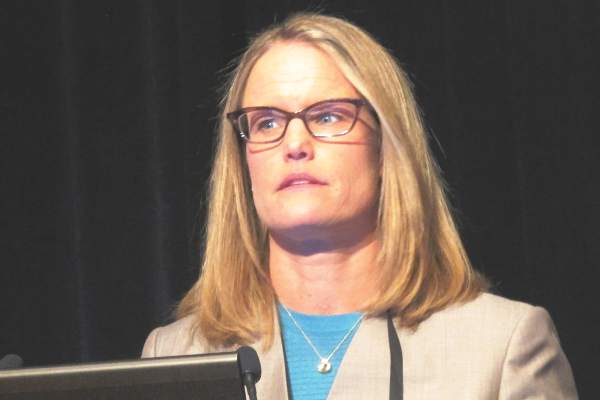User login
DENVER – The checkpoint inhibitor nivolumab continues to outflank docetaxel in the treatment of patients with advanced squamous cell non–small cell lung cancer, updated clinical trial results showed.
At 18 months’ follow-up, the overall survival (OS) rate of patients with advanced NSCLC treated with nivolumab (Opdivo) was more than double that of patients treated with docetaxel (Taxotere). Nivolumab was also associated with significantly better progression-free survival and median overall survival, reported Dr. Karen Reckamp of the City of Hope Comprehensive Cancer Center in Duarte, Calif.
She reported updated results of the Checkmate 017 trial at a world conference on lung cancer sponsored by the International Association for the Study of Lung Cancer..
“Nivolumab benefit was independent of PD-L1 expression and was [seen] across all clinical subgroups. The safety profile of nivolumab continues to be favorable versus docetaxel and is consistent with previous studies,” she said.
Nivolumab is a fully human programmed death-1 (PD-1) immune checkpoint inhibitor. It has been shown in clinical trials to offer a survival benefit with manageable toxicity, compared with docetaxel in patients with metastatic squamous and nonsquamous NSCLC who had disease progression after treatment with platinum-based doublet chemotherapy.
In Checkmate 017, patients with stage III or IV squamous NSCLC who had received firstline chemotherapy were randomly assigned to receive either nivolumab 3 mg/kg IV every 2 weeks (135 patients) or docetaxel 75 mg/m2 every 3 weeks (137 patients) until disease progression or unacceptable toxicities occurred.
At the 2015 annual meeting of the American Society of Clinical Oncology, Checkmate 017 investigators reported that nivolumab reduced the risk of death by 41%, compared with docetaxel, in previously treated advanced squamous NSCLC (hazard ratio [HR], 0.59; P = .00025) after 12 months of follow-up. The 1-year OS for patients treated with nivolumab was 42%, compared with 24% for patients treated with docetaxel.
In the current analysis after a minimum follow-up of 18 months, the overall survival rate for nivolumab-treated patients was 28%, compared with 13% for docetaxel-treated patients.
The median overall survival was 9.2 months and 6.0 months, respectively. The HR favoring nivolumab was 0.62 (P = .0004).
As noted before, the treatment effect on OS favored the checkpoint inhibitor over the taxane in all predefined subgroups, including prior chemotherapy type, region, age, Eastern Cooperative Oncology Group (ECOG) performance status, time from completion of last treatment regimen to randomizations, brain metastases, and smoking status.
The progression-free survival (PFS) rate at 18 months’ follow-up was also significantly better with nivolumab, at 17%, compared with 2.7%. The median PFS was 3.5 months and 2.8 months, prospectively, and the HR was 0.63 (P = .0008).
Treatment-related adverse events of any grade were seen in 59% of patients on nivolumab and 87% of those on docetaxel. Grade 3 or greater adverse events occurred in 8% of patients on the checkpoint inhibitor, vs. 58% of those treated with the taxane.
There were no deaths among nivolumab-treated patients, but two docetaxel-treated patients died.
Although the results are encouraging and consistent with those seen in other clinical trials of nivolumab in second-line therapy for squamous NSCLC, performance status is a limiting factor, commented Dr. Solange Peters of the Lausane (Switzerland) University Hospital, the invited discussant.
She noted that all patients in Checkmate 017 had an Eastern Cooperative Oncology Group status of 0 or 1.
She also noted that OS with nivolumab (9.2 months) is only incrementally better in the unselected patient population than with docetaxel (6.3 months), or with targeted therapies such as afatinib (7.9 months) or erlotinib (6.8 months).
“Unselected squamous cell carcinoma of the lung remains a disease characterized by a high unmet medical need,” she said.
The study was sponsored by Bristol-Myers Squibb. Dr. Reckamp and Dr. Peters disclosed receiving consulting fees from the company.
DENVER – The checkpoint inhibitor nivolumab continues to outflank docetaxel in the treatment of patients with advanced squamous cell non–small cell lung cancer, updated clinical trial results showed.
At 18 months’ follow-up, the overall survival (OS) rate of patients with advanced NSCLC treated with nivolumab (Opdivo) was more than double that of patients treated with docetaxel (Taxotere). Nivolumab was also associated with significantly better progression-free survival and median overall survival, reported Dr. Karen Reckamp of the City of Hope Comprehensive Cancer Center in Duarte, Calif.
She reported updated results of the Checkmate 017 trial at a world conference on lung cancer sponsored by the International Association for the Study of Lung Cancer..
“Nivolumab benefit was independent of PD-L1 expression and was [seen] across all clinical subgroups. The safety profile of nivolumab continues to be favorable versus docetaxel and is consistent with previous studies,” she said.
Nivolumab is a fully human programmed death-1 (PD-1) immune checkpoint inhibitor. It has been shown in clinical trials to offer a survival benefit with manageable toxicity, compared with docetaxel in patients with metastatic squamous and nonsquamous NSCLC who had disease progression after treatment with platinum-based doublet chemotherapy.
In Checkmate 017, patients with stage III or IV squamous NSCLC who had received firstline chemotherapy were randomly assigned to receive either nivolumab 3 mg/kg IV every 2 weeks (135 patients) or docetaxel 75 mg/m2 every 3 weeks (137 patients) until disease progression or unacceptable toxicities occurred.
At the 2015 annual meeting of the American Society of Clinical Oncology, Checkmate 017 investigators reported that nivolumab reduced the risk of death by 41%, compared with docetaxel, in previously treated advanced squamous NSCLC (hazard ratio [HR], 0.59; P = .00025) after 12 months of follow-up. The 1-year OS for patients treated with nivolumab was 42%, compared with 24% for patients treated with docetaxel.
In the current analysis after a minimum follow-up of 18 months, the overall survival rate for nivolumab-treated patients was 28%, compared with 13% for docetaxel-treated patients.
The median overall survival was 9.2 months and 6.0 months, respectively. The HR favoring nivolumab was 0.62 (P = .0004).
As noted before, the treatment effect on OS favored the checkpoint inhibitor over the taxane in all predefined subgroups, including prior chemotherapy type, region, age, Eastern Cooperative Oncology Group (ECOG) performance status, time from completion of last treatment regimen to randomizations, brain metastases, and smoking status.
The progression-free survival (PFS) rate at 18 months’ follow-up was also significantly better with nivolumab, at 17%, compared with 2.7%. The median PFS was 3.5 months and 2.8 months, prospectively, and the HR was 0.63 (P = .0008).
Treatment-related adverse events of any grade were seen in 59% of patients on nivolumab and 87% of those on docetaxel. Grade 3 or greater adverse events occurred in 8% of patients on the checkpoint inhibitor, vs. 58% of those treated with the taxane.
There were no deaths among nivolumab-treated patients, but two docetaxel-treated patients died.
Although the results are encouraging and consistent with those seen in other clinical trials of nivolumab in second-line therapy for squamous NSCLC, performance status is a limiting factor, commented Dr. Solange Peters of the Lausane (Switzerland) University Hospital, the invited discussant.
She noted that all patients in Checkmate 017 had an Eastern Cooperative Oncology Group status of 0 or 1.
She also noted that OS with nivolumab (9.2 months) is only incrementally better in the unselected patient population than with docetaxel (6.3 months), or with targeted therapies such as afatinib (7.9 months) or erlotinib (6.8 months).
“Unselected squamous cell carcinoma of the lung remains a disease characterized by a high unmet medical need,” she said.
The study was sponsored by Bristol-Myers Squibb. Dr. Reckamp and Dr. Peters disclosed receiving consulting fees from the company.
DENVER – The checkpoint inhibitor nivolumab continues to outflank docetaxel in the treatment of patients with advanced squamous cell non–small cell lung cancer, updated clinical trial results showed.
At 18 months’ follow-up, the overall survival (OS) rate of patients with advanced NSCLC treated with nivolumab (Opdivo) was more than double that of patients treated with docetaxel (Taxotere). Nivolumab was also associated with significantly better progression-free survival and median overall survival, reported Dr. Karen Reckamp of the City of Hope Comprehensive Cancer Center in Duarte, Calif.
She reported updated results of the Checkmate 017 trial at a world conference on lung cancer sponsored by the International Association for the Study of Lung Cancer..
“Nivolumab benefit was independent of PD-L1 expression and was [seen] across all clinical subgroups. The safety profile of nivolumab continues to be favorable versus docetaxel and is consistent with previous studies,” she said.
Nivolumab is a fully human programmed death-1 (PD-1) immune checkpoint inhibitor. It has been shown in clinical trials to offer a survival benefit with manageable toxicity, compared with docetaxel in patients with metastatic squamous and nonsquamous NSCLC who had disease progression after treatment with platinum-based doublet chemotherapy.
In Checkmate 017, patients with stage III or IV squamous NSCLC who had received firstline chemotherapy were randomly assigned to receive either nivolumab 3 mg/kg IV every 2 weeks (135 patients) or docetaxel 75 mg/m2 every 3 weeks (137 patients) until disease progression or unacceptable toxicities occurred.
At the 2015 annual meeting of the American Society of Clinical Oncology, Checkmate 017 investigators reported that nivolumab reduced the risk of death by 41%, compared with docetaxel, in previously treated advanced squamous NSCLC (hazard ratio [HR], 0.59; P = .00025) after 12 months of follow-up. The 1-year OS for patients treated with nivolumab was 42%, compared with 24% for patients treated with docetaxel.
In the current analysis after a minimum follow-up of 18 months, the overall survival rate for nivolumab-treated patients was 28%, compared with 13% for docetaxel-treated patients.
The median overall survival was 9.2 months and 6.0 months, respectively. The HR favoring nivolumab was 0.62 (P = .0004).
As noted before, the treatment effect on OS favored the checkpoint inhibitor over the taxane in all predefined subgroups, including prior chemotherapy type, region, age, Eastern Cooperative Oncology Group (ECOG) performance status, time from completion of last treatment regimen to randomizations, brain metastases, and smoking status.
The progression-free survival (PFS) rate at 18 months’ follow-up was also significantly better with nivolumab, at 17%, compared with 2.7%. The median PFS was 3.5 months and 2.8 months, prospectively, and the HR was 0.63 (P = .0008).
Treatment-related adverse events of any grade were seen in 59% of patients on nivolumab and 87% of those on docetaxel. Grade 3 or greater adverse events occurred in 8% of patients on the checkpoint inhibitor, vs. 58% of those treated with the taxane.
There were no deaths among nivolumab-treated patients, but two docetaxel-treated patients died.
Although the results are encouraging and consistent with those seen in other clinical trials of nivolumab in second-line therapy for squamous NSCLC, performance status is a limiting factor, commented Dr. Solange Peters of the Lausane (Switzerland) University Hospital, the invited discussant.
She noted that all patients in Checkmate 017 had an Eastern Cooperative Oncology Group status of 0 or 1.
She also noted that OS with nivolumab (9.2 months) is only incrementally better in the unselected patient population than with docetaxel (6.3 months), or with targeted therapies such as afatinib (7.9 months) or erlotinib (6.8 months).
“Unselected squamous cell carcinoma of the lung remains a disease characterized by a high unmet medical need,” she said.
The study was sponsored by Bristol-Myers Squibb. Dr. Reckamp and Dr. Peters disclosed receiving consulting fees from the company.
AT THE IASLC WORLD CONFERENCE
Key clinical point: The checkpoint inhibitor nivolumab provides a survival advantage over docetaxel in advanced squamous non–small cell lung cancer.
Major finding: The median overall survival was 9.2 months for nivolumab-treated patients and 6.0 months for docetaxel-treated patients.
Data source: A randomized clinical trial in 272 patients with stage III or IV squamous NSCLC.
Disclosures: The study was sponsored by Bristol-Myers Squibb. Dr. Reckamp and Dr. Peters disclosed receiving consulting fees from the company.


